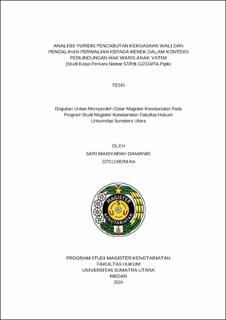Analisis Yuridis Pencabutan Kekuasaan Wali dan Pengalihan Perwalian Kepada Nenek dalam Konteks Perlindungan Hak Waris Anak Yatim (Studi Kasus Perkara Nomor 57/Pdt.G/2024/PA.Pspk)
Legal Analysis of Guardianship Revocation and Transfer of Guardianship to The Grandmother in The Context of Inheritance Rights Protection for Orphaned Children (Case Study of Decision Number 57/Pdt. G/2024/PA.Pspk)

Date
2024Author
Damanik, Sari Maisyarah
Advisor(s)
Purba, Hasim
Sembiring, Rosnidar
Metadata
Show full item recordAbstract
Indonesia's legal system places significant emphasis on protecting children's rights, particularly orphaned children requiring guardianship to safeguard their inheritance rights. This is reflected in various legal instruments, such as Law No. 1 of 1974 on Marriage, the Compilation of Islamic Law (KHI). and Law No. 35 of 2014 on Child Protection. The research addresses three core issues: (1) How Indonesian law regulates the revocation and transfer of guardianship, (2) The legal considerations of the court in revoking the guardian's authority and transferring guardianship to the grandmother in Case Number 57/Pdt.G/2024/PA.Pspk, and (3) The legal implications of the court's decision on inheritance protection and its management by the new guardian.
This research employs normative legal methods with a statute and case approach, utilizing descriptive analysis of primary legal sources such as statutes, secondary sources like books and journals, and tertiary supporting materials. Data collection was conducted through literature reviews and semi-structured interviews with a judge from the Medan Religious Court, analyzed qualitatively, with deductive reasoning to resolve the legal issues at hand.
The study reveals that Indonesia's legal framework comprehensively governs guardianship revocation and transfer through the Marriage Law, KHI and Child Protection Law. The judge in Decision Number 57/Pdt.G/2024/PA.Pspk adopted a multi-perspective approach in revoking the biological father's guardianship and transferring it to the grandmother. This decision was based on the guardian's negligence, the replacement guardian's capability, and the best interests of the child, particularly regarding the management of inheritance and Taspen funds. The decision has significant legal implications, including legitimizing the grandmother as the new guardian, mandating the bookkeeping of the child's assets, and establishing court supervision mechanisms. To enhance the guardianship system's effectiveness, harmonization of regulations, development of detailed eligibility standards for replacement guardians, and periodic monitoring and evaluation systems for inheritance management by guardians are essential.
Collections
- Master Theses (Notary) [2299]
